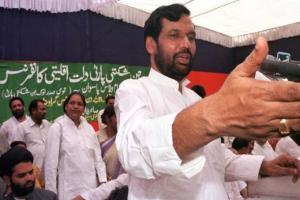Ram Vilas Paswan was an officer in the Bihar Administrative Service before joining politics

Ram Vilas Paswan. Pic/AFP
Ram Vilas Paswan, who became the champion of Dalit politics in Bihar, passed away on Thursday. With his demise, he has left behind a void in regional and national politics.
ADVERTISEMENT
Whether it is the ruling party or the opposition, leaders from all political parties are heartbroken over the departure of a politician who evoked the respect of his contemporaries, cutting across party lines.
Paswan, who left an indelible impression on Dalit politics, was born on July 5, 1946, in Shahrabanni village in Bihar's Khagaria district. His political journey began in 1969 when he became a member of the Bihar Legislative Assembly by winning on a joint Socialist Party ticket.
He was an officer in the Bihar Administrative Service before joining politics.
Paswan spent the entire duration of the national Emergency in the mid-1970s in jail. He joined the Janata Party after the Emergency was lifted.
He won the Hajipur parliamentary seat in the 1977 general election by more than 4 lakh votes on a Janata Party ticket, which is a milestone in the nation's electoral history. With this record victory, he became a shining star on the nation's political firmament.
Senior politician Shivanand Tiwari says Ram Vilas Paswan may have been in any political alliance but he was never personally hostile to anybody.
Talking about his memories of Paswan, he said that he had not sent an invitation by mistake for a wedding at his home. "When he came to know about it, he reached my doorstep without waiting and complained why I hadn't invited him. At that time we were in different parties," added Tiwari.
After the 1977 record, Ram Vilas Paswan won the 1980 and 1989 Lok Sabha elections and then became a minister in the central government. For the next several years, he held a number of portfolios ranging from rail to telecom and coal.
He was a member of several political alliances with the BJP, the Congress, the RJD and the JD-U and continued to be a minister in the central government.
Paswan was Minister for Food and Consumer Affairs in both the governments led by Narendra Modi.
Ram Vilas Paswan broke his ties with the NDA after resigning as a minister in the then Atal Bihari Vajpayee government after the Godhra riots in Gujarat.
He then joined the Congress-led United Progressive Alliance (UPA) and was a two-time minister in the Manmohan Singh cabinet.
In 2014, Paswan once again quit the UPA and joined the NDA. He was included in the Union Cabinet in both the Narendra Modi governments formed in 2014 and in 2019.
Paswan, who created a unique record by working with six Prime Ministers, was once famously described by RJD President Lalu Prasad on a lighter note as a 'weather scientist' of politics indicating his prolivity for gauging the popular mood and the direction in which the political winds were blowing.
The seasoned politician who founded the Lok Janshakti Party (LJP), also participated extensively in Jayaprakash Narayan movement in the 1970s. Those who know him say Paswan joined politics to touch the lives of those on the margins of society.
He used to get emotional whenever he saw anybody battling poverty.
Vashistha Narayan Singh, the state president of JD-U, who has been associated with Paswan for 45 years, says that they were together in Phulwari jail in Patna during the JP movement. "This is an emotional moment. Even if he met me in the Rajya Sabha, he would always enquire about my well-being."
Keep scrolling to read more news
Catch up on all the latest Crime, National, International and Hatke news here. Also download the new mid-day Android and iOS apps to get latest updates.
Mid-Day is now on Telegram. Click here to join our channel (@middayinfomedialtd) and stay updated with the latest news
This story has been sourced from a third party syndicated feed, agencies. Mid-day accepts no responsibility or liability for its dependability, trustworthiness, reliability and data of the text. Mid-day management/mid-day.com reserves the sole right to alter, delete or remove (without notice) the content in its absolute discretion for any reason whatsoever
 Subscribe today by clicking the link and stay updated with the latest news!" Click here!
Subscribe today by clicking the link and stay updated with the latest news!" Click here!







